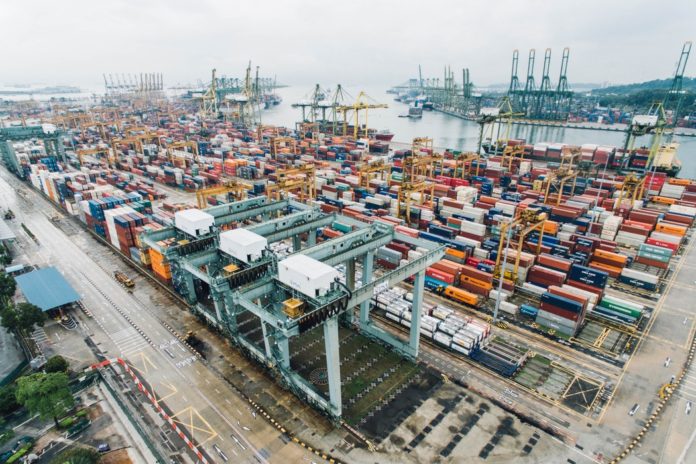The Maritime and Port Authority of Singapore (MPA) has launched its Maritime Innovation Lab (MIL). The MIL is part of the broader MPA Living Lab efforts and consists of both physical and digital aspects to serve as a co-creation platform for innovation. The purpose-built facility will create an environment that enables experimentation and the test-bedding of innovative port services and intelligent ship operations. It also supports the Sea Transport Industry Transformation Map through encouraging open innovation and R&D partnerships among industry, regulator and the research and technology communities.
The MIL was launched in conjunction with Singapore Maritime Week 2019.
17 organisations, including ST Engineering, Keppel Offshore and Marine, Kongsberg, Wartsila, A*STAR, maritime companies and local universities, showcased their R&D projects and innovative solutions for the maritime industry. This new developer space, located at PSA Vista, will accelerate the development of new operation concepts and systems, and build local technological capabilities in key areas, ensuring that the sea port is future-ready. Industry partners, research institutes and local universities will be able to plug in to the test beds, data hub and regulatory sandbox to develop their own maritime solutions and capabilities.
“The setup of the Maritime Innovation Lab is an important milestone in Singapore’s journey to be the global maritime hub for connectivity, innovation and talent. The facility will support the Sea Transport Industry Transformation Map by strengthening the maritime industry’s partnership with research and technology communities, co-creating solutions to address industry challenges and developing innovative concepts and services for the industry,” said Dr Lam Pin Min, Senior Minister of State, Ministry of Transport and Ministry of Health, the Guest-of-Honour at the launch event.
Quah Ley Hoon, Chief Executive of MPA, said, “We are glad to have like-minded partners who strongly believe in the importance of experimentation and open innovation. Together with PSA and Jurong Port Living Lab, the Maritime Innovation Lab adds to the maritime research and innovation ecosystem, which will help take the maritime sector to a new level of development in areas such as automation, data analytics and intelligent systems. With stronger partnerships and deeper collaborations, Maritime Singapore will be able to stay ahead of the curve as a world class hub port and international maritime centre.”
ST Engineering and Kongsberg NorControl have also jointly launched the Next Generation Vessel Traffic Management System (NGVTMS) Lab today. Co-located within the MIL, this $9.9 million setup will realise the development of new vessel traffic capabilities, such as an advanced data communications system for information exchange between ships and port authorities, which enables comprehensive maritime situation awareness for safety and efficiency. The programme would also see collaborations with A*STAR, including its Institute of Higher Computing and Institute of Infocomm Research.
ST Engineering, PSA Marine and MPA are collaborating to design and develop a remotely-assisted pilotage advisory. The RAPA solution incorporates Internet-of-Things sensors and communications systems to enable remote pilotage from shore-based stations. Shore-based marine pilots will be provided with an augmented situational awareness of vessel navigation through real-time video imagery and vessel traffic information, assisted with a collision avoidance software.
MPA has set up a cross-agency Steering Committee to develop strategies, including an implementation roadmap of autonomous maritime operations and capabilities, and a regulatory sandbox. These will facilitate the test-bedding of projects and trials that enable Singapore’s port to receive Maritime Autonomous Surface Ships.
In driving new growth areas, MPA has initiated five autonomous ship projects with industry partners. These projects include: Smart Maritime Autonomous Vessel, a collaboration between ST Engineering and PACC Offshore Services Holdings (POSH) and American Bureau of Shipping (ABS); Autonomous Flotsam Clearance Vessel, jointly developed by ST Engineering and the Singapore University of Technology and Design; IntelliTug, a collaboration between Wartsila, PSA Marine and Technology Centre for Offshore and Marine Singapore (TCOMS) that focuses on the development of an autonomous tugboat to enhance productivity and navigational safety in the port; Keppel Autonomous Tug, a project by Keppel Offshore and Marine and ABS that focuses on the development of autonomous tugboat to enhance productivity and navigational safety in port; ST Engineering, Mitsui & Co. Ltd, MPA and Lloyd’s Register have also embarked on the world’s largest ocean-going Autonomous Vessel Programme, to jointly develop and validate navigation intelligence for autonomous ocean-going vessel operations. Incorporating testing routes across global locations such as the Suez Canal, Panama Canal, Straits of Malacca and Singapore, the project will see the sharing of data, knowledge and application of test scenarios. This will enable MPA to evolve port infrastructure and regulations to support autonomous operations in the port.
In supporting Maritime Singapore’s ongoing digitisation transformation, MPA has also launched the Singapore Maritime Data Hub (SG-MDH), a one-stop data repository, to catalyse the development and test-bedding of innovative digital applications and services for the maritime industry.
The use of SG-MDH was demonstrated through innovative applications developed by technology start-ups such as SG Smart Tech, which uses the data on vessel positions on their SeaCabbie platform to enable efficient routing of launch boat operations that reduce transit time and save fuel. Claritecs also showcased the Bunker Maestro platform, which allows ship bunker operators to optimise their fleet operations.
The use of blockchain technology in cargo documentation, known as Bills of Lading, was earlier announced by Pacific International Lines and IBM. The pilot project was showcased at the event.
MPA had shared its cybersecurity framework for maritime sector and showcased some of the measures put in place. This is in conjunction with the Singapore Maritime Technology Conference track on cybersecurity.
In developing Singapore’s maritime innovation ecosystem, MPA has been working to strengthen linkages across and within the maritime ecosystem that would push the boundary of future capabilities. This includes strong alignment on innovation and R&D efforts between public and private sectors, and promotion of digitalisation of maritime industry through ecosystem partnerships.
















